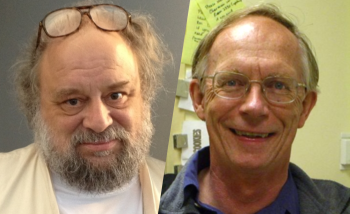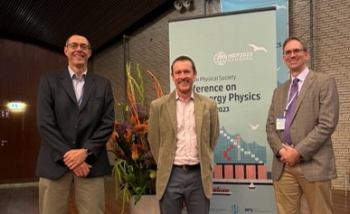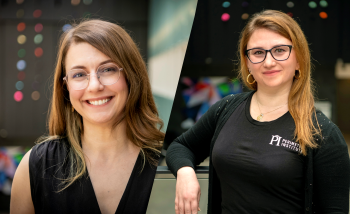Condensed matter physicist Subir Sachdev has been awarded the 2018 Lars Onsager Prize from the American Physical Society for his contributions to the theory of quantum phase transitions, quantum magnetism, and fractionalized spin liquids, and for his leadership in the physics community.
Sachdev’s work has primarily focused on condensed matter physics, which seeks to understand the properties of materials on a microscopic basis. Many of his contributions – including descriptions of the diverse varieties of entangled states of quantum matter – have been linked to experiments.
Sachdev is currently the Herchel Smith Professor of Physics at Harvard University and Cenovus Energy James Clerk Maxwell Chair (Visiting) at Perimeter. The Lars Onsager Prize recognizes outstanding research in theoretical statistical physics. Previous winners include Nobel laureates Michael Kosterlitz, David Thouless, and Chen-Ning Yang,
A cornerstone of Sachdev’s work is his ongoing effort to understand quantum phase transitions.
Though classical phase transitions – such as water transitioning from a liquid to a solid during freezing – are relatively well understood, their quantum counterparts are much more mysterious. Sachdev’s pioneering work in this area has formed the basis of much subsequent research; his book, Quantum Phase Transitions, has been described as the seminal text of the field.
His research into a class of materials known as “strange metals” – materials that become superconductors when cooled – led to a breakthrough that could ultimately aid in the search for a practical, room-temperature superconductor. Sachdev’s description of how the electrons inside strange metals become entangled at a quantum level (known as the SYK, or Sachdev-Ye-Kitaev, model) provided the fundamental description of the materials that had eluded researchers for years.
In recent years, Sachdev and other researchers around the world have investigated other applications of the SYK model, for example, to describe how interacting particles of pure information, or qubits, might behave. The work has rippled into fields beyond condensed matter physics, including quantum information, black hole studies, and string theory.
A leader in the physics community, Sachdev is a fellow of the American Physical Society and the National Academy of Sciences, and holds the visiting Homi J. Bhabha Chair at the Tata Institute of Fundamental Research in Mumbai, India. In 2015, he received the Dirac Medal for the Advancement of Theoretical Physics, awarded by the Australian Institute of Physics, the University of New South Wales, and the Royal Society of New South Wales.
The Lars Onsager Prize was endowed in 1993 by Russell and Marian Donnelly in memory of Lars Onsager, a physical chemist and theoretical physicist who was awarded the Nobel Prize in Chemistry in 1968.
Further exploration
About PI
Perimeter Institute is the world’s largest research hub devoted to theoretical physics. The independent Institute was founded in 1999 to foster breakthroughs in the fundamental understanding of our universe, from the smallest particles to the entire cosmos. Research at Perimeter is motivated by the understanding that fundamental science advances human knowledge and catalyzes innovation, and that today’s theoretical physics is tomorrow’s technology. Located in the Region of Waterloo, the not-for-profit Institute is a unique public-private endeavour, including the Governments of Ontario and Canada, that enables cutting-edge research, trains the next generation of scientific pioneers, and shares the power of physics through award-winning educational outreach and public engagement.
You might be interested in



